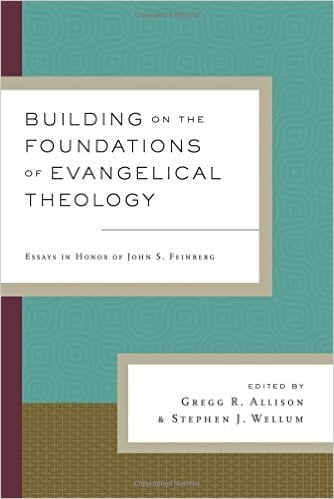⏱️ Estimated Reading Time: 4 min read
You never know exactly what you’re going to get when you read a Festschrift. Sometimes you will find a collection of insightful essays engaging and advancing the thoughts and works of a gifted scholar. Other times you will find nothing more than an effort to publish their own self-important ideas under the guise of hagiography. More often than not the work is a mixture of the two. But Building on the Foundations of Evangelical Theology is more the former than the latter. It is a good work that both honors the respected Dr. John Feinberg and yet attempts to advance his theological contributions.
Dr. Feinberg has been serving in professional academia since 1976, having served at a number of respected theological institutions. He has trained and equipped many of the most popular and appreciated theologians of our day. His published works are still used and referenced by scholars and students everywhere, and his contributions, particularly to the subject of the problem of evil, are much appreciated. It seems right, then, to honor such a man. And the collection of scholars that Stephen Wellum and Greg Allison have compiled for this work are, in their own right, respected, and bring some insightful discussions to this volume.
The book is broken down into three parts, “organized around the metaphor of building” (9-10). So, section one discusses the “Architecture of Evangelical Theology,” exploring subjects like methodology, hermeneutics, relationship of the Old and New Testament to one another, philosophy, and apologetics. Section two focuses on “setting the foundation.” Here readers will engage in various theological doctrines: the doctrine of God, the doctrine of Scripture, the problem of evil, Christology, and pneumatology. Finally, section three explores the most advanced discussions of the “superstructure” of Evangelical theology. This section covers topics like bioethics, Christian living, religious pluralism, and womanist theology.
The work as a whole combines both the best of honor and theological engagement. If ever there was a book that honored a fellow scholar it is this one. The authors regularly engage with Dr. Feinberg’s work. They are not simply using him as a means to advance their own soapboxes. The various contributors reveal the breadth of Feinberg’s intellectual erudition. Keith Yandell’s chapter on the Trinity is one positive example of this, as he spends pages interacting with Feinberg’s views on the eternal generation of the Son and the procession of the Spirit. Furthermore, revealing their depth of love for Dr. Feinberg and his ill wife, the royalties of the book will not go to their various contributors but to the Huntington’s Disease Society of America. It’s truly a beautiful testimony to their respect for their colleague, mentor, and friend.
The work also seeks to further the conversations that Feinberg started in his scholarship. So, Kevin Vanhoozer has written a fascinating piece on the development of doctrine. He notes that it is Dr. Feinberg who laid the groundwork for the question that is driving his essay: which best accounts for doctrinal development: analytic or hermeneutic theology (17). Likewise, Thomas Provenzola has written an attractive, if dense, essay on Feinberg’s engagement of Alvin Plantinga’s Reformed Epistemology. Here he furthers Feinberg’s original discussion, comparing the two views and offering an augmented explanation of Plantinga’s system. In nearly every essay we see intellectual engagement of Feinberg, not merely a passing reference to him. The one exception to this seems to be Robert Saucy’s essay on the “salvation of Israel” in Paul’s epistle to the Romans.
I thoroughly enjoyed this collection. There’s much to value in it and appreciate. Not every essay is convincing, nor are the all accessible to those less trained in philosophy. But they are worth the diligent effort of all who take the time to navigate them. This work balances well respect for a modern academic hero, and yet insightful theological engagement in its own right. I commend Building on the Foundations of Evangelical Theology to those with some advanced knowledge seeking some fresh work within the realm of orthodoxy.



